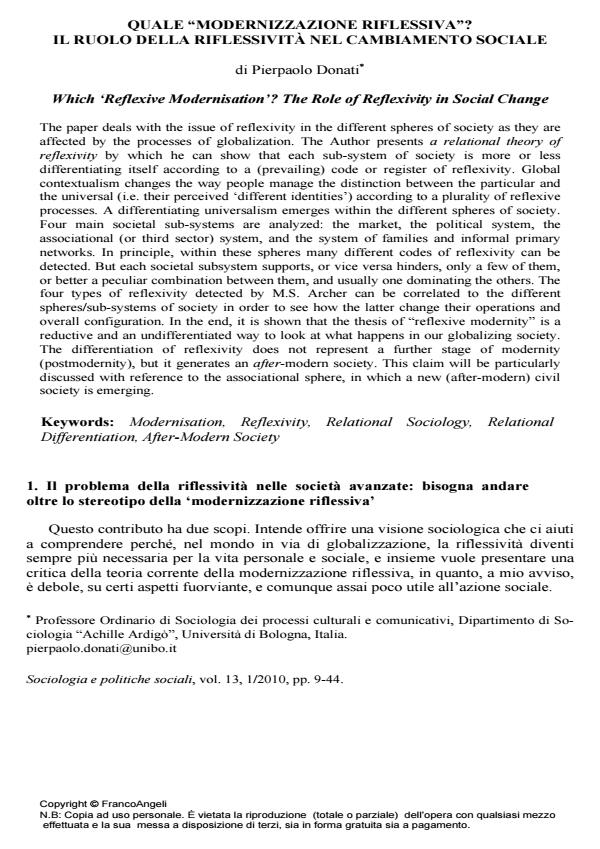Which "Reflexive Modernisation"? The Role of Reflexivity in Social Change
Journal title SOCIOLOGIA E POLITICHE SOCIALI
Author/s Pierpaolo Donati
Publishing Year 2010 Issue 2010/1
Language Italian Pages 36 P. 9-44 File size 690 KB
DOI 10.3280/SP2010-001002
DOI is like a bar code for intellectual property: to have more infomation
click here
Below, you can see the article first page
If you want to buy this article in PDF format, you can do it, following the instructions to buy download credits

FrancoAngeli is member of Publishers International Linking Association, Inc (PILA), a not-for-profit association which run the CrossRef service enabling links to and from online scholarly content.
The paper deals with the issue of reflexivity in the different spheres of society as they are affected by the processes of globalization. The Author presents a relational theory of reflexivity by which he can show that each sub-system of society is more or less differentiating itself according to a (prevailing) code or register of reflexivity. Global contextualism changes the way people manage the distinction between the particular and the universal (i.e. their perceived ‘different identities’) according to a plurality of reflexive processes. A differentiating universalism emerges within the different spheres of society. Four main societal sub-systems are analyzed: the market, the political system, the associational (or third sector) system, and the system of families and informal primary networks. In principle, within these spheres many different codes of reflexivity can be detected. But each societal subsystem supports, or vice versa hinders, only a few of them, or better a peculiar combination between them, and usually one dominating the others. The four types of reflexivity detected by M.S. Archer can be correlated to the different spheres/sub-systems of society in order to see how the latter change their operations and overall configuration. In the end, it is shown that the thesis of "reflexive modernity" is a reductive and an undifferentiated way to look at what happens in our globalizing society. The differentiation of reflexivity does not represent a further stage of modernity (postmodernity), but it generates an after-modern society. This claim will be particularly discussed with reference to the associational sphere, in which a new (after-modern) civil society is emerging.
Keywords: Modernisation, Reflexivity, Relational Sociology, Relational Differentiation, After-Modern Society
- ‘All together now!’Couples and the ontological problem of cohabitation as a form of life Luca Martignani, in International Review of Sociology /2011 pp.565
DOI: 10.1080/03906701.2011.625665 - Double reflexivity and social change: towards a critical understanding of reflexive actions and discourses in sport for development and peace Dino Numerato, Eva Soares Moura, in Qualitative Research in Sport, Exercise and Health /2025 pp.1
DOI: 10.1080/2159676X.2025.2556281
Pierpaolo Donati, Quale "modernizzazione riflessiva"? Il ruolo della riflessività nel cambiamento sociale in "SOCIOLOGIA E POLITICHE SOCIALI" 1/2010, pp 9-44, DOI: 10.3280/SP2010-001002